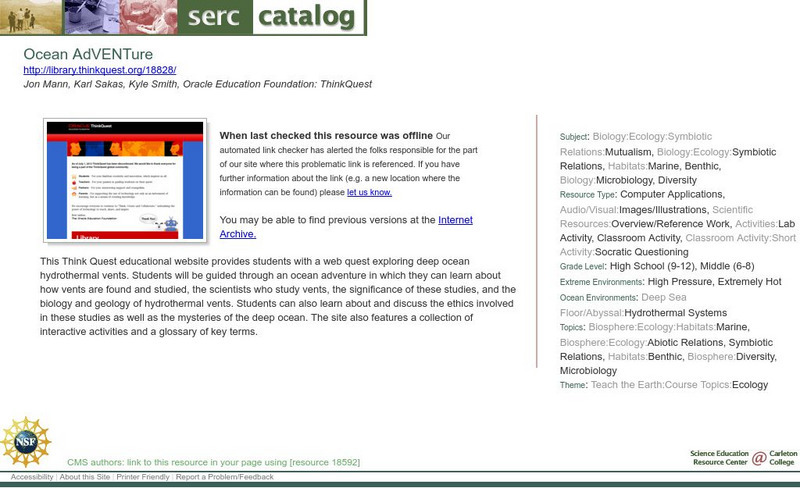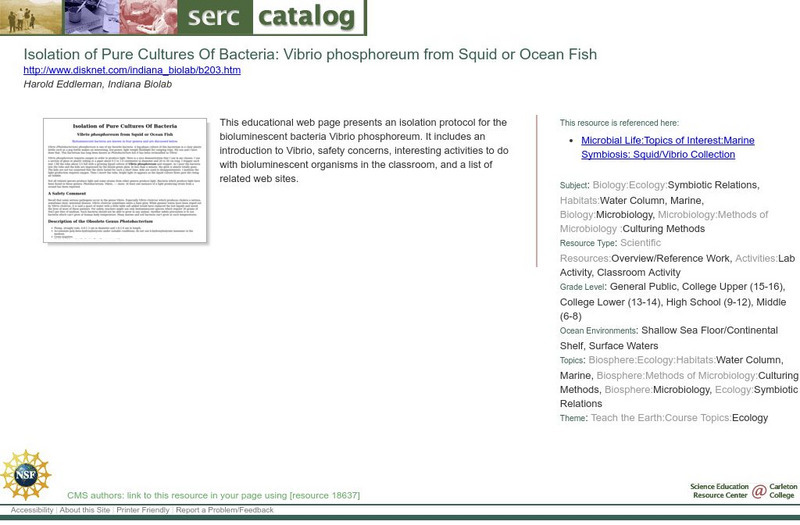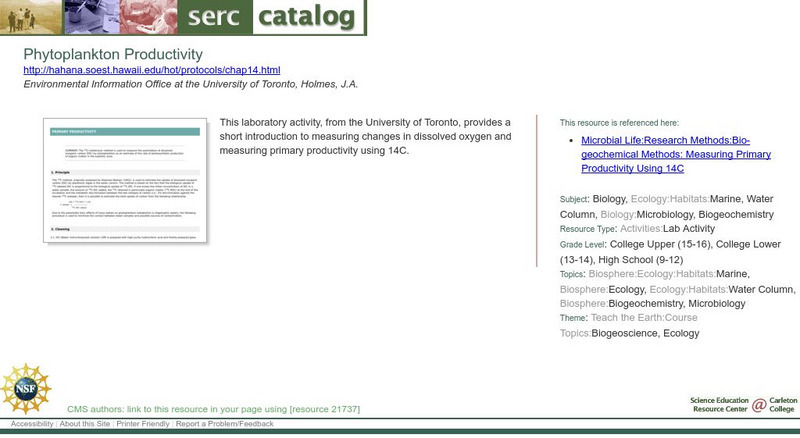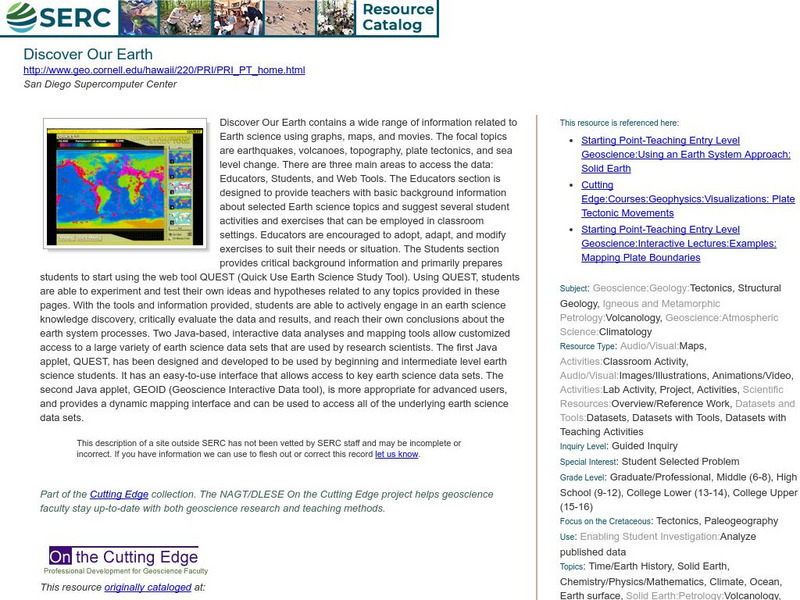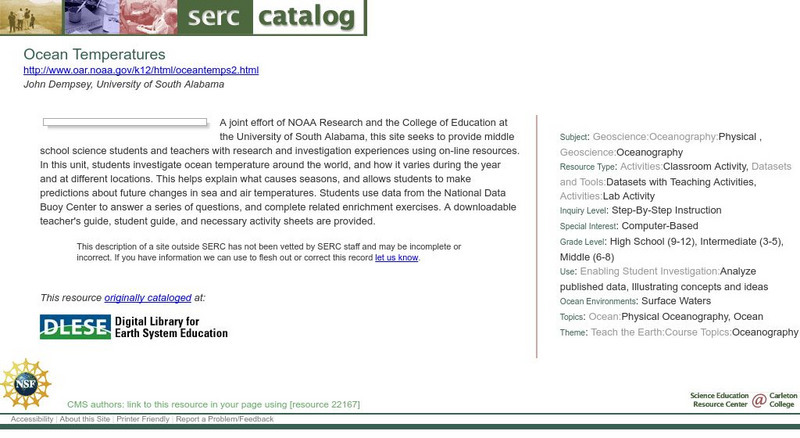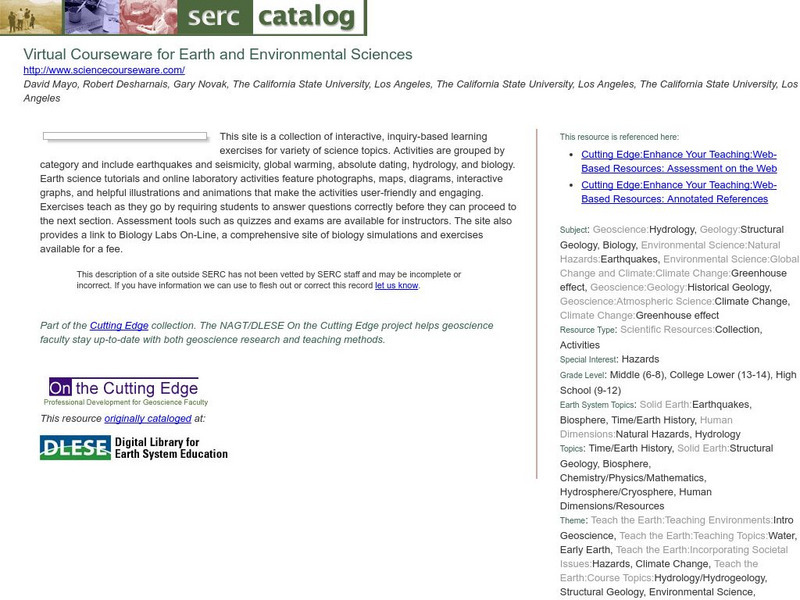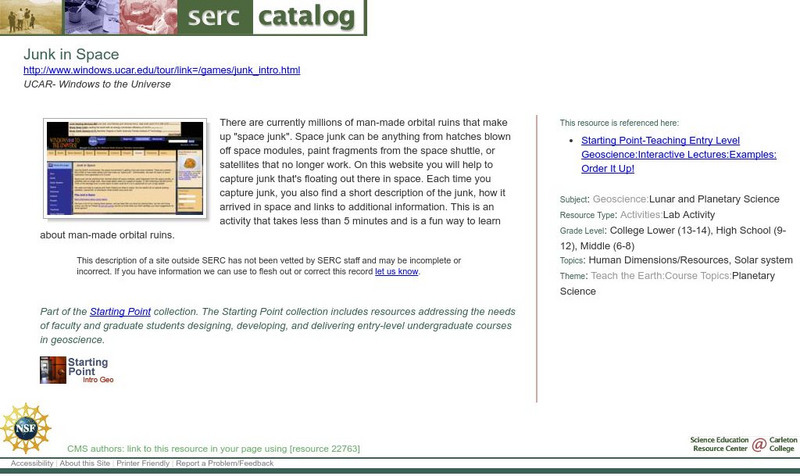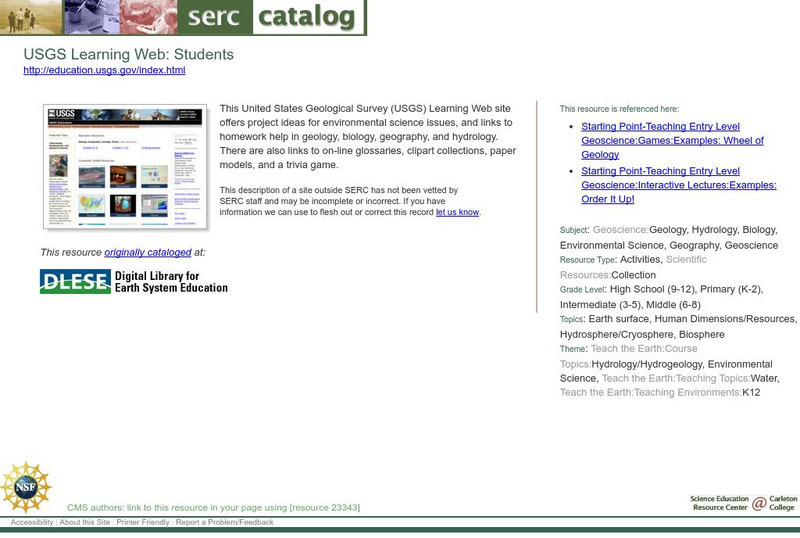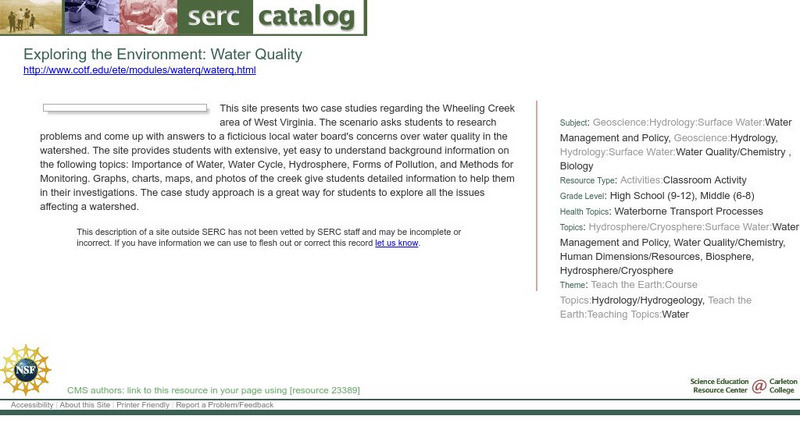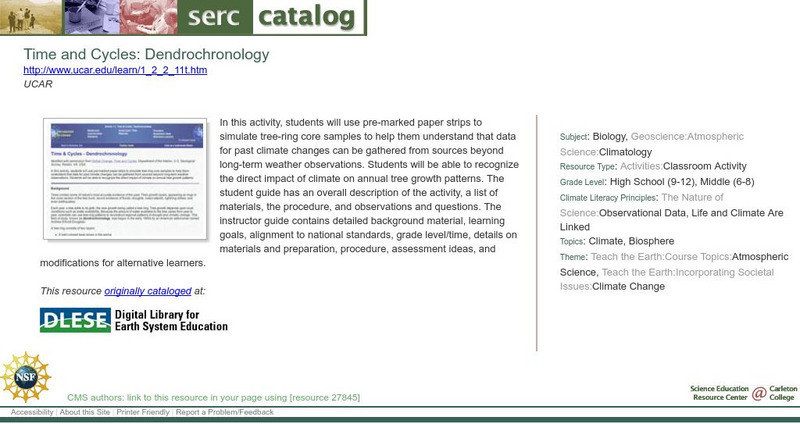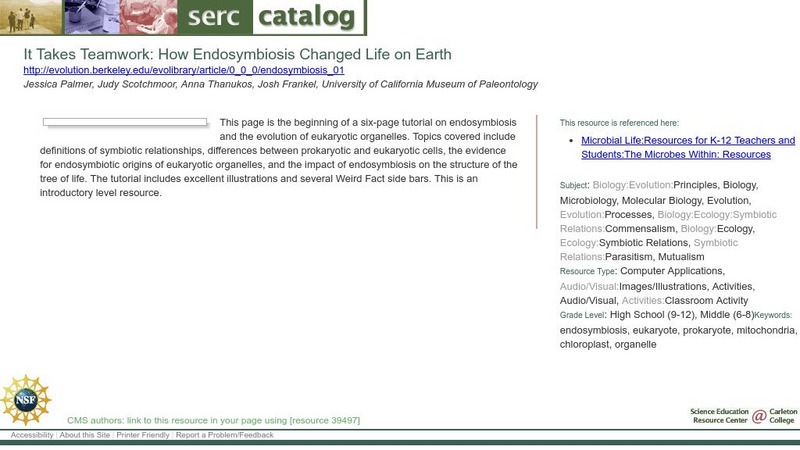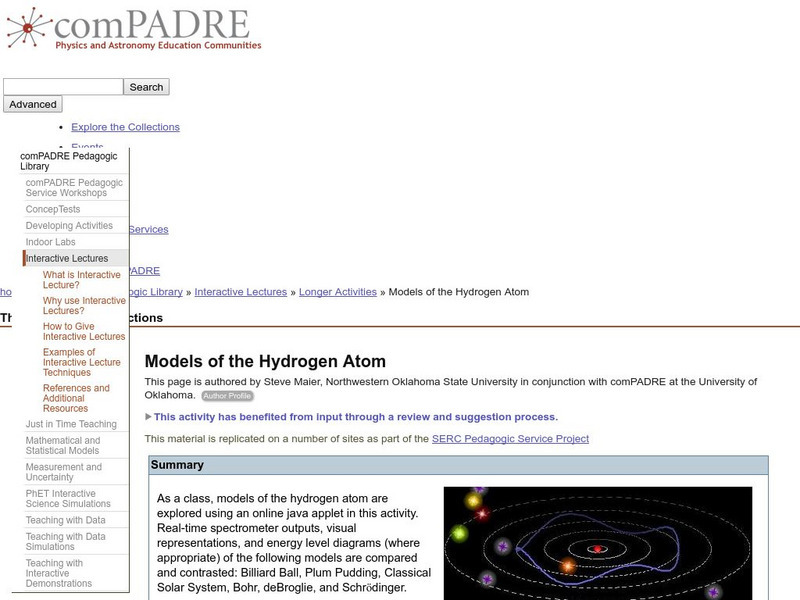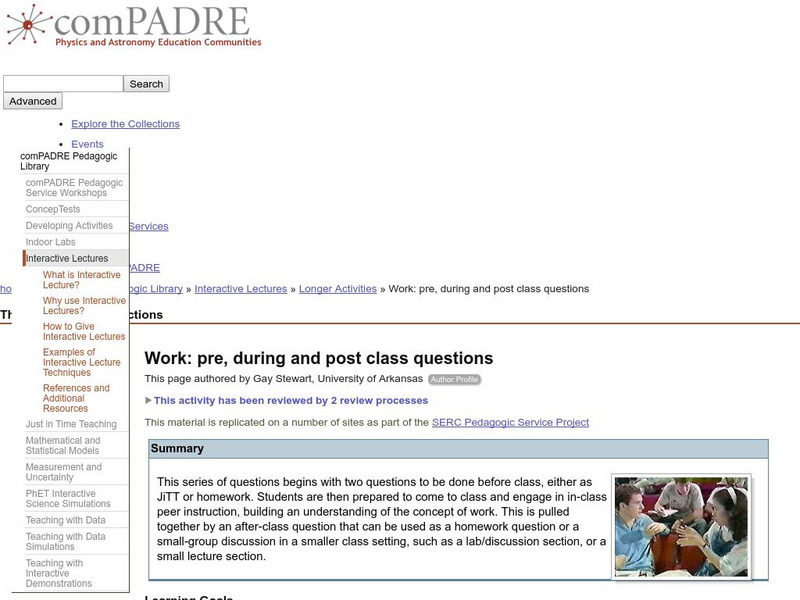Science Education Resource Center at Carleton College
Serc: Investigative Case: Living in an Alkaline Environment
Explore living in an alkaline environment with this three-part interactive activity. During these activity students will complete web quests and activities to investigate the ecology and diversity of life in this environments.
Science Education Resource Center at Carleton College
Serc: Investigative Case: Protistan Tales of Atlantic White Cedar Swamps
A WebQuest where learners explore microbial diversity by looking at the extreme habitat of the Atlantic White Cedar Swamp. Students will learn about protists through personification theme of Aesop's Fables. At the end of the lesson,...
Science Education Resource Center at Carleton College
Serc: Kamchatka: Siberia's Forbidden Wilderness
Take a journey to the Kamchatka Peninsula to understand the historical, biological, and geological wonders of this place. In the "Living Edens" program, students will explore the uniqueness of this place through a PBS program and website...
Science Education Resource Center at Carleton College
Serc: Investigating the Ocean Algal Blooms
This NOAA computer-based activity is designed to teach students in grades 9-12 how satellite imagery and remote sensing can be used to monitor harmful algal blooms (HABs). This lesson teaches students how to read and interpret satellite...
Science Education Resource Center at Carleton College
Serc: Microbes in Action
The Microbes in Action program serves to promote an understanding and appreciation of the importance of microorganisms in our world by providing scientific information, hands-on activities, articles and news, curriculum units, and other...
Science Education Resource Center at Carleton College
Serc: Ocean Ad Ven Ture
Students can learn about hydrothermal vents with this web quest that explores the deep ocean. Site allows students go on an ocean adventure to learn about the vents from scientist that study them.
Science Education Resource Center at Carleton College
Serc: Isolation of Pure Cultures of Bacteria
A web page that gives activities for use of bioluminescent organisms in the classroom. Specifically on the page is "an isolation protocol for the bioluminescent bacteria Vibrio phosphoreum".
Science Education Resource Center at Carleton College
Serc: Phytoplankton Productivity
A lab experiment to estimate the rate of photosynthesis by measuring the dissolved inorganic carbon found in the water. Students will be able to calculate primary productivity of the phytoplankton in this lab
Science Education Resource Center at Carleton College
Serc: Discover Our Earth
Study earthquakes, volcanoes, topography, plate tectonics, and sea level change using graphs, maps, and movies. Engage in earth science knowledge discovery, critically evaluate the data and results, and reach conclusions about the earth...
Science Education Resource Center at Carleton College
Serc: Ocean Temperature
A unit where students explore the seasons by researching the change in ocean temperature at different times of the year and different locations. Lesson includes teacher guide and student worksheets.
Science Education Resource Center at Carleton College
Serc: Learn: Atmospheric Science Explorers
Learning modules created by teachers for teachers to increase the "knowledge of and interest" in the atmospheric sciences. Modules include background information, hands-on activities, and assessments. Modules cover topics such as ozone,...
Science Education Resource Center at Carleton College
Serc: Virtual Courseware for Earth and Environmental Sciences
The Virtual Courseware Project produces interactive, online simulations for the life science laboratory or for earth science studies. The activities are designed to enhance an existing curriculum and include online assessments. They can...
Science Education Resource Center at Carleton College
Serc: Junk in Space
Did you know that there is millions of man-made "space junk" floating in orbit? This game will have you collecting space junk but you have to be careful not collect any objects that should be in space!
Science Education Resource Center at Carleton College
Serc: Paleotopia: Windows to the Past
A link to a website that contains teacher materials for a game that reinforces the concepts learned about fossils. Students can understand how the record of life on Earth is revealed by fossils as they become paleontologist in this game...
Science Education Resource Center at Carleton College
Serc: Climate Time Line Information Tool
A tool that summarizes climate history for time spans from 1 year to 100,000 years ago and beyond. It explores the relation between human development, weather, and climate. Students learn how past climate is measured, provides basic...
Science Education Resource Center at Carleton College
Serc: Radioactive Decay Calculator
Students will use this online Radioactive Decay Calculator to compute radioactive decay, timed decay, and timed solid disposal for a databank containing 116 isotopes. This calculator also features University of British Columbia disposal...
Science Education Resource Center at Carleton College
Serc: Distribution of Active Volcanoes Exercise
This six-week long exercise asks students to gather, chart, interpret, and synthesize data on current volcanic events. A brief role playing activity and virtual field trip concludes the exercise.
Science Education Resource Center at Carleton College
Serc: Usgs Learning Web: Students
Project ideas for environmental science issues, and links to homework help in geology, biology, geography, and hydrology.
Science Education Resource Center at Carleton College
Serc: Exploring the Environment: Water Quality
A project based scenario where students research problems and come up with answers to a local water board's concerns over water quality in the watershed. Background information is accessible for the following topics: importance of water,...
Science Education Resource Center at Carleton College
Serc: Time and Cycles: Dendrochronology
Students explore the direct impact of climate on annual tree growth patterns by using pre-marked paper strips to simulate tree-ring core samples.
Science Education Resource Center at Carleton College
Serc: Ocean World
A link to a website with information about the ocean. Learn about ocean processes, oceanography, physical oceanography, and get real-time ocean data. Site contains college-level and beyond textbook as well as teaching materials.
Science Education Resource Center at Carleton College
Serc: It Takes Teamwork: How Endosymbiosis Changed Life on Earth
A tutorial on symbiotic relationships that explores the differences between prokaryotic and eukaryotic cells as well as the origins of eukaryotic organelles possibly being from endosymbiotic relationship. This tutorial also offers...
Science Education Resource Center at Carleton College
Serc: Models of the Hydrogen Atom
In this activity, students will explore several different models of the hydrogen atom and compare and contrast them using an online java applet.
Science Education Resource Center at Carleton College
Serc: Com Padre: Work: Pre, During and Post Class Questions
This is a collection of questions to be presented to students at three points during a study of the concept of work. Two questions are given before beginning the topic, the next set while studying it in class, and the last set as...







